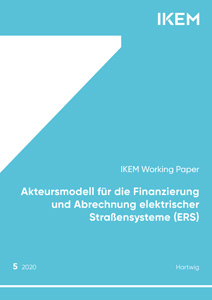AMELIE
Overhead line trucks are a building block for the electrification of heavy goods traffic. IKEM develops ideas for a suitable legal framework.

In recent years, both the EU and the German government have presented ambitious climate plans that will require a rapid decarbonisation of all sectors of the economy.
While this can be accom-plished primarily via battery technologies in the passenger car sector, there is a growing need for an electric road system (ERS) to decarbonise heavy goods traffic. A system of this kind, however, must be integrated into the highly regulated existing economic and technical systems – both on the road and in the energy industry – and envisaged in a European context. The establishment of ERS is thus accompanied by considerable political, legal and economic challenges. Tasks such as planning, con-struction, network operation, toll collection, billing and all mobility services must be assigned by the relevant stakeholders efficiently and in a way that is both technically and economically feasible in accordance with existing law. At the same time, obstacles for transport companies must be removed and incentives created for such companies to use ERS so that the benefits of the new infrastructure are realised, both economically and in terms of climate impact, in a timely manner through a rapid market ramp-up.
Although the current legislation already provides a good framework for ERS in some areas, it will not be possible to develop and operate ERS without some adjustment. This paper presents recommendations for important modifications.
Overhead line trucks are a building block for the electrification of heavy goods traffic. IKEM develops ideas for a suitable legal framework.
© Institute for Climate Protection, Energy and Mobility – Law, Economics and Policy e.V.
